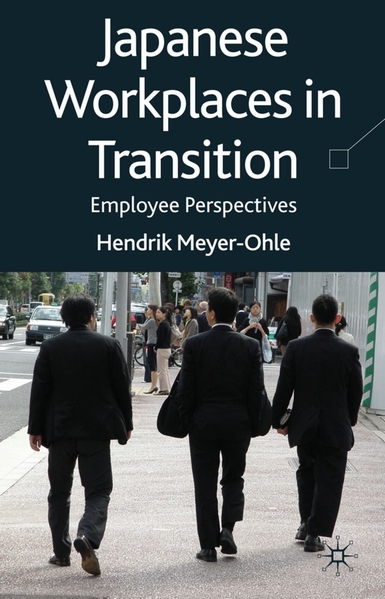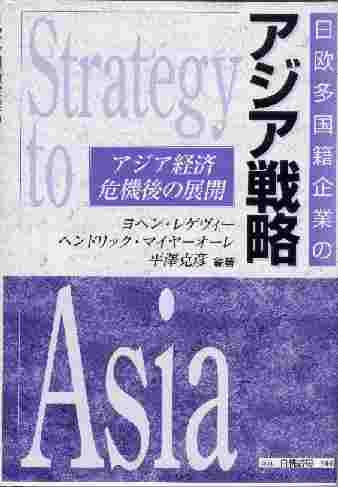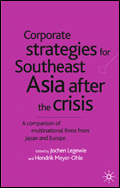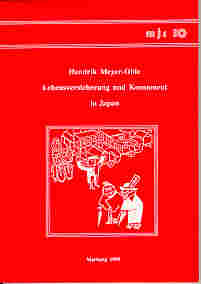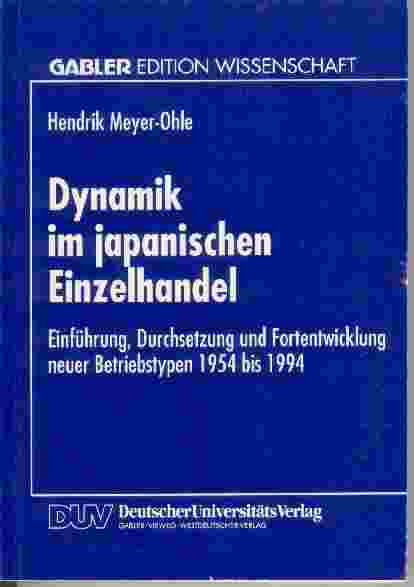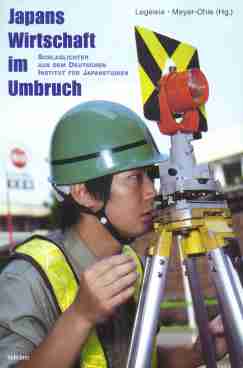|
Dr Hendrik Meyer-Ohle Associate Professor National
University of Singapore
Education
Employment National University of
Singapore
German Institute of
Japanese Studies, (DIJ),
Tokyo
Japan Centre - Philipps
University Marburg April-September 1994 Research Associate
- Japan Centre - Philipps University Marburg Longer Overseas Research
Periods and Awards
Teaching Regularly Taught JS2101 Approaches to
Japanese Studies I JS2225 Marketing and
Consumer Culture in Japan JS2230 Itadakimasu
- Food in Japan JS3222 Japanese Business
Management JS3227 Entrepreneurship:
Self-made in Japan JS4232 FDI and Local
Development: Japanese Firms in Asia JS2880A Field Exposure
Japan: Fashion Business GEH1016 Understanding
Consumption Modules previously taught JS1101e Introduction to
Japanese Studies JS2221 Organization of Japanese
Business JS2226 Global City Tokyo JS3101 Approaches to
Japanese Studies II JS4227 Japanese Political
Economy JS5102 Reading in Japanese
Studies II Graduate Student
Supervision I am supervising research
students writing their theses on topics of Japanese business and economy. If
you are interested in graduate studies at the Department of Japanese Studies
at NUS, please visit the departmental homepage for more information on
programs and scholarships. Research Current Research: Organization of Human
Resources Management of Japanese Firms This project looks at the way that Japanese companies organize the human resources management function. What role does the human resources management department play in Japanese companies and is this role changing? What are the expectations towards people working in human resources management and is professionalization advancing? This project is being conducted in collaboration with Harald Conrad from Dusseldorf University. Current Issues in Japanese
Retailing I continue my longstanding
interest in retailing in Japan and the role of retailing in Japanese society.
I have recently looked at how convenience stores are to play an increasing
role in catering for an aging and shrinking population. I have also looked at
employees in retailing, especially how companies have been dealing with
increasing labour shortages. Currently, I am looking at employment in the
fashion industry as well as the consequences of a now long period of shopping
mall development on the outlook of Japanese cities. Internationalization of
Human Resources and Diversity in Japanese Companies Japanese companies have
begun to systematically recruit foreign employees into their operations in
Japan. I am investigating this new trend under the issues of international
human resources management, workplace diversity, migration brokerage and
international talent mobility. This project is being conducted in
collaboration with Harald Conrad from Dusseldorf University. Previous and Other Research
Interests Shopping Centers as Places of Marketing and Consumption The number of shopping centers has been increasing rapidly in Japan over the
last decade with developers in an intensifying competition constantly testing
the frontiers in terms of locations, size, or tenant mix. The development of
shopping centers is taking place in a climate of an
aging and shrinking population, economic uncertainties and increasing
differentiation within Japanese society and between metropolitan centers and the rest of Japan. Thus
with this project I not only want to look at the managerial techniques of
shopping center development in Japan but also want
to look at shopping centers as places that mirror
and to a certain degree also drive the above developments. A sabbatical in
Japan provided me with the opportunity to visit a large number of shopping centers and inner city shopping
districts. Japanese Workplaces in
Transition In this project, I looked
at changes in Japanese workplaces from the 1990s onwards. Here I
employed an innovative research approach by combining traditional research
sources with accounts of restructuring as found in online diaries (blogs). In
their online diaries employees provide vivid accounts of experience at their work places and talk about their concerns and motivations
in an employment system that is showing signs of grave changes. In this
project I looked at employee perspectives on three areas, the downsizing of
corporations, changes in employment conditions for regular employees and the
increasing number of non-regularly employed people and substantiated the
findings from blog accounts through survey results from Japanese government
agencies and think tanks. (Book details below) Consumer Goods
Distribution: especially Retailing In the study of the
Japanese distribution system I am looking at several
areas: The first area is the development of Japanese retail formats. In my
book "Dynamics and Innovation in Japanese Retailing (details see
below) I trace the development of retail formats in Japan from the 1950s,
beginning with the introduction of techniques such as self-service and chain
management and leading to the conceptualization of food supermarkets, general
merchandising stores, drug stores, home centers,
and convenience stores. In looking at these developments I find it of special
importance to look at changes in the environment. For Japan emphasis has to be given to governmental distribution policy and I
have especially looked at the political economy of the retail sector. Another
major factor are manufacturer-retailer relationships. Japanese manufacturers
have long strived for a dominance of their distribution channels and were
slow in accepting mass-merchandisers as legitimate sales channels for their
products. Since the 1990s various changes have occurred in the relationship
between retailers and manufacturers and I have tried to analyze
these changes at an early stage. However, developments in retailing cannot be
explained without looking at entrepreneurial initiative and as in other
countries Japan's retail sector has produced its fare
share of entrepreneurs. I have looked at entrepreneurship in Japanese
retailing in the past and today and have found it to be a fascinating area of
research with entrepreneurs in this sector being strong and colorful personalities forcefully pursuing not only the
growth of their companies but also the diffusion of their retail concepts and
philosophies. I have also looked at the activities of foreign companies in
Japan and here especially at how they are trying to drive change in the
Japanese distribution system (a short outline is here). International Marketing of
Japanese Companies in Southeast Asia Within this research I
focused on the marketing strategies of Japanese companies for the emerging
markets of Southeast Asia. Together with a colleague (Jochen Legewie) I have led a project that looked at strategies
of Japanese and European companies in Southeast Asia and have edited the book
Corporate Strategies for Southeast Asia after the Crisis, myself
focusing especially on issues of marketing. I have also done additional work
on Japanese retailers in Southeast Asia. Publications (Selection) (For details and table of contents please click on book covers)
Japanese Workplaces in Transition - Employee Perceptions, Houndmills,Basingstoke: Palgrave Macmillan 2009.
亨德里克.迈耶.奥勒 日本零售业的创新和动态:从技术到业态,再到系统, 知识产权出版社 2010
Innovation and Dynamics in Japanese
Retailing - From Techniques to Formats to Systems, Houndmills, Basingstoke: Palgrave Macmillan 2003.
ヨヘン レゲヴィーヘンドリック マイヤーオーレ平澤克彦 編『日欧多国籍企業のアジア戦略アジア経済危機後の展開』 白桃書房 2002.
(Editor with Jochen Legewie) Corporate Strategies for Southeast Asia After the Crisis. A Comparison of Multinational Firms From Japan and Europe, Houndmills, Basingstoke: Palgrave 2000.
Lebensversicherung und Konsument in Japan (Life Insurance
and Consumer in Japan). Marburger Japan-Reihe Bd. 10. Marburg 1993:
Förderverein Marburger Japan-Reihe. Dynamik im japanischen Einzelhandel.
Einführung, Durchsetzung und Fortentwicklung neuer Betriebstypen 1954-1994 (Dynamism in
Japanese Retailing: Introduction and Development of New Retail Formats
1954-1994). Gabler Edition Wissenschaft. Wiesbaden 1995: Deutscher
Universitäts-Verlag. Japans Wirtschaft im Umbruch. Schlaglichter aus dem Deutschen Institut für Japanstudien (Japanese Economy in Transition: Spotlights from the German Institute for Japanese Studies). Iudicium 1999. (Editor with Jochen Legewie).
Articles and Book Chapters Working the shopping mall:
Labour shortages and the dualities in Japan’s labour economy. Contemporary
Japan, 34(1), pp.42-57. https://doi.org/10.1080/18692729.2022.2028226 with Harald Conrad, Training
Regimes and Diversity: Experiences of Young Foreign Employees in Japanese
Headquarters. Work, Employment and
Society, 36 (2) 2022, pp. 199-216. https://doi.org/10.1177/0950017020966537 Business
Models, Stakeholders and Capabilities in Coping with Societal Grand
Challenges: the Case of Japan’s Convenience Stores. Asian Business & Management, 20 (4) (2021), pp. 465-487. https://link.springer.com/article/10.1057/s41291-021-00152-4 https://doi.org/10.1007/s10551-018-3824-3 with Harald Conrad,
Japanese Multinational Companies and the Control of
Overseas Investments. Mobilities of
Labour and Capital in Asia: Spatialities,
Institutions, and Cultures, Preet S. Aulakh, and Philip F. Kelly, eds,
Cambridge University Press 2020, 48-71. with Harald Conrad, Transnationalization of a Recruitment Regime - Skilled
Migration to Japan. International Migration, 57(3) (2019) pp. 250-265,
online open access at https://onlinelibrary.wiley.com/doi/full/10.1111/imig.12529 with Harald Conrad,
Overcoming the Ethnocentric Firm? – Foreign Fresh University Graduate
Employment in Japan as a New International Human Resource Development Method.
The
International Journal of Human Resource Management, 13(17)
(2019), pp. 2525-2543. Online 1 June
2017, online open access at http://dx.doi.org/10.1080/09585192.2017.1330275 Post-Bubble Department
Stores, in Consuming
Life in Post-Bubble Japan - A Transdisciplinary Perspective, Katarzyna J. Cwiertka and Ewa Machotka (eds), Amsterdam University Press 2018, pp.
31-48, open access to whole book at http://www.oapen.org/search?identifier=644263;keyword=Consuming
Life with Harald Conrad, Brokers and the Organization of Recruitment of ‘Global
Talent’ by Japanese Firms — A Migration Perspective. Social
Science Japan Journal, 21(9) (2018), pp. 67-88, online open
access at https://doi.org/10.1093/ssjj/jyx032 with Kikuchi Kazuo and Nishi
Takahiro, シンガポールの流通と日系百貨 (Singapore Distribution and Japanese
Department Stores), in 日系小売企業のアジア展開 (The Development of Japanese Retailers in Asia), 柳 純
(Yanagi Jun), 鳥羽 達郎
(Toba Tastsuro) (eds.), Chuo Keizaisha
2017, pp. 161-176. Consumer Goods Distribution
and Logistics in Japan, in Routledge Handbook of Japanese Business and Management
Parissa Haghiran (ed.),
Routledge 2016, pp. 340-349. Japanese retailers in
Southeast Asia: Strong Local Partners, Shopping Malls,
and Aiming for Comprehensive Internationalization. The
International Review of Retail, Distribution and Consumer Research,
24(5) (2014), pp. 500-515. http://dx.doi.org/10.1080/09593969.2014.968186 Two Asian Malls: Urban
Shopping Centre Development in Singapore and Japan, Asia Pacific Business
Review, 15 (2009), (1), pp.123-135. http://dx.doi.org/10.1080/13602380802399445 Labour Market and Labour
Market Policies for the Ageing Society, The Demographic Challenge: A
Handbook about Japan, Florian Coulmas, Harald
Conrad, Annette Schad-Seifert
and Gabriele Vogt (eds.), Brill 2008, pp. 947-962. http://booksandjournals.brillonline.com/content/books/10.1163/ej.9789004154773.i-1199.393 with Yu Jie, Working for
Japanese Corporations in China: A Qualitative Study, Asian Business &
Management, 7 (1) (2008), pp. 33-51. https://doi.org/10.1057/palgrave.abm.9200250 Flexibilisierung
des japanischen Arbeitsmarkts: Beschäftigungsmöglichkeiten für Jung und Alt,
aber zu welchem Preis? (Flexibilisation
of the Japanese labor market - employment
opportunities for the young and the old, but at what price?), Japan nach Koizumi - Wandel in Politik, Wirtschaft und
Gesellschaft (Japan after Koizumi - changes in politics, economy and
society), Michael Behrens and Jochen Legewie (Ed.),
Nomos 2007, pp. 165-175. https://www.nomos-elibrary.de/10.5771/9783845211169-164/flexibilisierung-des-japanischen-arbeitsmarkts-beschaeftigungsmoeglichkeiten-fuer-jung-und-alt-aber-zu-welchem-preis Veränderungen im japanischen Distributionssystem
(Changes in the Japan's distribution system), Japans
Zukunftsindustrien (Japan's Future Industries),
Andreas Moerke and Anja Walke
(Ed.) Springer
2007, pp. 351-361. https://link.springer.com/chapter/10.1007%2F978-3-540-29808-3_17 Unternehmertum
im Japanischen Einzelhandel seit den 1990er Jahren (Entrepreneurship in
Japanese Retailing since the 1990s), Konvergenz oder Divergenz? Wandel der
Unternehmensstrukturen in Japan und Deutschland (Convergence or
Divergence? Change in enterprise
structures in Japan and Germany), Cornelia Storz and Bernard Langeman (Ed.), Metropolis 2005, pp. 271-298. Walking with Dinosaurs: General
Trading Companies in the Reorganization of Japanese Consumer Goods Distribution, International Journal of
Retail & Distribution Management, 32 (2004), 1, pp. 45-55. https://doi.org/10.1108/09590550410515542 The Crisis of Japanese
Retailing at the Turn of the Millennium – A Crisis of Corporate
Governance and Finance, International Review of Retail, Distribution and
Consumer Research, 12 (2003), 1, pp. 13-28. http://dx.doi.org/10.1080/09593960110103797 Ein
Blick auf die Wettbewerber – Internationale Marketingstrategien japanischer
Unternehmen für südostasiatische Konsummärkte (A Look at the Competitors -
International Marketing Strategies of Japanese Companies for Southeast Asian
Consumer Markets), Marktstrategien Asien Pazifik, Karin Dietz (Hg.),
Wiesbaden: Gabler 2001. (with
Daniel Dirks, Martin Hemmert, Jochen Legewie, Franz Waldenberger) The
Japanese Employment System in Transition, International Business Review
9 (2000), pp. 525-553. https://doi.org/10.1016/S0969-5931(00)00017-2 (with
Jochen Legewie) Does Nationality Matter? Western
and Japanese Multinational Corporations in Southeast Asia, European Review
8, 4 (2000), pp.. 553-567. https://doi.org/10.1017/S106279870000510X Collaborating for Change in
Japanese Consumer Goods Distribution – Strategic Alliances, Team
Merchandising and „Enemies in the Same Boat“, Japanese
Distribution Strategy, Michael Czinkota und
Masaaki Kotabe (Ed.), London: Thomson Learning
2000, pp. 117-134. Konsumgüterdistribution
– Suche nach leistungsstarken Partnern und einer zukunftsweisenden Arbeitsteilung
(Consumer Goods Distribution - Search for Strong Partners and a
Forward-looking Distribution of Functions), Japan ist offen – Chancen für
deutsche Unternehmen, Heinz Riesenhuber und Josef Kreiner (Hg.),
Heidelberg: Springer, 1998, pp.89-106. http://www.springer.com/us/book/9783540642862 Struktur und Organisation des
Distributions- und Dienstleistungssektors. In: Deutsches Institut für
Japanstudien (ed): Die Wirtschaft
Japans (The Japanese Economy). Heidelberg: Springer, 1998, S. 183-210. https://link.springer.com/chapter/10.1007%2F978-3-642-58792-4_8 Dienstleistungen
in der japanischen Wirtschaft – ein Überblick (Services in the
Japanese Economy: An Overview), Japanstudien 9 (1997) pp.25-56. https://www.dijtokyo.org/doc/JS9_Meyer-Ohle.pdf Revolution
in der japanischen Distribution? Großunternehmen des Einzelhandels in einer
Phase der Neuorientierung (Revolution in Japanese Retailing? Large Retail
Companies Going Through a Period of Reorientation). In: Handesforschung
1996/1997, Jahrbuch der Forschungsstelle für den Handel Berlin (FfH)
e.V., pp. 379-397. https://link.springer.com/chapter/10.1007/978-3-663-05654-6_20 Binnenhandelspolitik, ein
Stiefkind japanischer Wirtschaftspolitik? Konzepte, Maßnahmen, Hintergründe
und Akteure der Politik für den Handel (Distribution Policy, a Stepchild of
Japanese Economic Policy? Concepts, Measures, Background and Actors). In: Japanstudien: Jahrbuch des deutschen
Instituts für Japanstudien der Philipp-Franz-von-Siebold-Stiftung (München:
iudicum verlag), Vol.7 (1995), pp. 279-321. https://www.dijtokyo.org/doc/JS7_Meyer-Ohle.pdf Wer kauft wo? Zur
Einkaufsstättenwahl japanischer Konsumenten (Who Shops Where? Store Choice of
Japanese Consumers). In: Japanstudien:
Jahrbuch des deutschen Instituts für Japanstudien der
Philipp-Franz-von-Siebold-Stiftung (München: iudicum verlag), Vol.5
(1993), pp. 171-207. https://www.dijtokyo.org/doc/JS5_Meyer-Ohle.pdf The Future of Japanese Manufacturer-Retailer Relationships. In: Best Paper Proceedings. The Association
of Japanese Business Studies (AJBS) 9th Annual Meeting Nagoya, Japan, S.
303-314. Other Activities I have reviewed papers and book manuscripts for Routledge, Association of Japanese Business Studies, Euro-Asia-Management-Studies Association, Japanstudien, Sloan Management Review, International Review of Retail, Distribution and Consumer Research, Asian Business and Management, and others. Dr Hendrik Meyer-Ohle, Department of Japanese Studies, National University of Singapore, Blk AS8, 10 Kent Ridge Crescent, Singapore 119260, Email: meyerohle@nus.edu.sg, Tel. +65 - 6516 8942, Fax +65 - 6776 1409 |
|
|



